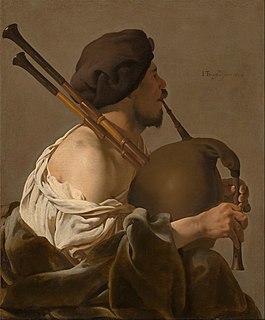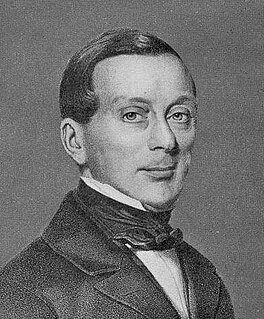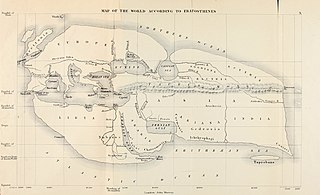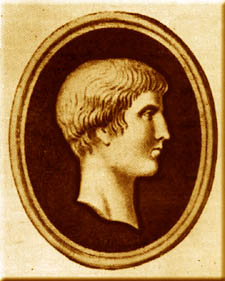
Bagpipes are a woodwind instrument using enclosed reeds fed from a constant reservoir of air in the form of a bag. The Scottish Great Highland bagpipes are the best known in the Anglophone world; however, bagpipes have been played for a millennium or more throughout large parts of Europe, northern Africa, and western Asia, including Turkey, the Caucasus, and around the Persian Gulf. The term bagpipe is equally correct in the singular or plural, though pipers usually refer to the bagpipes as "the pipes", "a set of pipes" or "a stand of pipes".
Sextus Julius Africanus was a Christian traveler and historian of the late second and early third centuries. He is important chiefly because of his influence on Eusebius, on all the later writers of Church history among the Church Fathers, and on the whole Greek school of chroniclers.

The uilleann pipes are the characteristic national bagpipe of Ireland. Earlier known in English as "union pipes", their current name is a partial translation of the Irish-language term píobaí uilleann, from their method of inflation. There is no historical record of the name or use of the term uilleann pipes before the twentieth century. It was an invention of Grattan Flood and the name stuck. People mistook the term 'union' to refer to the 1800 Act of Union; this is incorrect as Breandán Breathnach points out that a poem published in 1796 uses the term 'union'.
Melankomas, or Melancomas, was an Ancient Greek boxer from Caria and victor in the 207th Olympiad. Known to us mainly from the 28th and 29th Discourses of Dio Chrysostom, in which that writer uses his life as a canvas for a discussion of the ideal athlete and the ideal man, Dio praises his athleticism, good looks, and brave heart. With regard to his boxing, claims for him a unique style: he would totally avoid the punches of the other boxer without throwing any himself. Dio says he never lost a match, hit an opponent, or was struck by an opponent. Themistius reports that the emperor Titus was his lover.
Cassius Dio or Dio Cassius was a Roman statesman and historian of Greek origin. He published 80 volumes of history on ancient Rome, beginning with the arrival of Aeneas in Italy. The volumes documented the subsequent founding of Rome, the formation of the Republic, and the creation of the Empire, up until 229 AD. Written in Ancient Greek over 22 years, Dio's work covers approximately 1,000 years of history. Many of his 80 books have survived intact, or as fragments, providing modern scholars with a detailed perspective on Roman history.

Eunapius was a Greek sophist and historian of the 4th century AD. His principal surviving work is the Lives of Philosophers and Sophists, a collection of the biographies of 23 philosophers and sophists.
Cebes of Thebes was an Ancient Greek philosopher from Thebes remembered as a disciple of Socrates. One work, known as the Pinax (Πίναξ) or Tabula, attributed to Cebes still survives, but it is believed to be a composition by a pseudonymous author of the 1st or 2nd century CE.
Phlegon of Tralles was a Greek writer and freedman of the emperor Hadrian, who lived in the 2nd century AD.

An aulos or tibia (Latin) was an ancient Greek wind instrument, depicted often in art and also attested by archaeology.

King Sanatruces of Parthia ruled the Parthian Empire from c. 93/2 BC to 88/87 BC during his first reign and c. 77 to 70 BC during his second reign. He was a member of the Arsacid house, who proclaimed himself king in Susiana and attempted to usurp the throne of Mithridates II. Ultimately, Gotarzes I forced him to flee to the Central Asian steppe. Years later, according to work attributed to Lucian, he regained the throne with the aid of the Sacaraucae Scythians or Saka, an Indo-European tribe akin to the Parthians who had invaded Iran in about 77 BC.

The primacy of Peter, also known as Petrine primacy, is the position of preeminence that is attributed to Saint Peter among the Twelve Apostles.

Jacob Geel was a Dutch scholar, critic and librarian.

Charondas was a celebrated lawgiver of Catania in Sicily. It is uncertain when he lived; some identify him as a pupil of Pythagoras, but all that can be said is that he lived earlier than Anaxilas of Rhegium, since his laws were in use amongst the Rhegians until they were abolished by that tyrant. His laws, originally written in verse, were adopted by the other Chalcidic colonies in Sicily and Italy.

Arethas of Caesarea was Archbishop of Caesarea Mazaca in Cappadocia early in the 10th century, and is considered one of the most scholarly theologians of the Greek Orthodox Church. The codices produced by him, containing his commentaries are credited with preserving many ancient texts, including those of Plato and Marcus Aurelius' "Meditations".
An epigonion was an ancient stringed instrument mentioned in Athenaeus, probably a psaltery.
Cassius Apronianus was a Roman senator who lived in the 2nd century. He married the daughter of the Greek historian, orator, and philosopher Dio Chrysostom. Their son was the historian, consul and senator Cassius Dio.
The gens Hosidia was a family at Rome during the last century of the Republic, and into imperial times. The most illustrious of the gens, Gnaeus Hosidius Geta, obtained the consulship in AD 47.
The Nero Redivivus legend was a belief popular during the last part of the 1st century that the Roman emperor Nero would return after his death in 68 AD. The legend was a common belief as late as the 5th century. The belief was either the result or cause of several pretenders who posed as Nero leading rebellions.

Homonoia is the concept of order and unity, being of one mind together or union of hearts. It was used by the Greeks to create unity in the politics of classical Greece. It saw widespread use when Alexander the Great adopted its principles to govern his vast Empire.
The public domain consists of all the creative works to which no exclusive intellectual property rights apply. Those rights may have expired, been forfeited, expressly waived, or may be inapplicable.

The Encyclopædia Britannica Eleventh Edition (1910–11) is a 29-volume reference work, an edition of the Encyclopædia Britannica. It was developed during the encyclopaedia's transition from a British to an American publication. Some of its articles were written by the best-known scholars of the time. This edition of the encyclopedia, containing 40,000 entries, is now in the public domain, and many of its articles have been used as a basis for articles in Wikipedia. However, the outdated nature of some of its content makes its use as a source for modern scholarship problematic. Some articles have special value and interest to modern scholars as cultural artifacts of the 19th and early 20th centuries.














